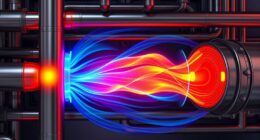Are you tired of wasting money on inefficient heating systems? Look no further!
In our updated guide, we unveil the secrets to maximizing energy efficiency in heat pumps. We’ll help you navigate through the confusing world of energy efficiency ratings, comparing different models to find the most cost-effective option for your home.
Say goodbye to sky-high utility bills and hello to cozy warmth without breaking the bank.
Let’s take control of our energy consumption together!

Key Takeaways
- SEER and HSPF ratings are used to measure cooling and heating efficiency respectively, with higher ratings indicating greater energy efficiency.
- Energy efficiency in heat pumps leads to lower energy consumption, increased comfort, government incentives, and environmental benefits.
- Factors such as proper installation, sizing, ductwork, and insulation affect the energy efficiency ratings of heat pumps.
- Different types of heat pumps, such as air-source, ground-source, and hybrid, have varying energy efficiency ratings, and maximizing energy efficiency in operation is crucial.
Understanding Energy Efficiency Ratings
Let’s start by understanding the energy efficiency ratings of heat pumps. When it comes to measuring energy consumption, these ratings play a crucial role in determining the efficiency of a heat pump system.
The most common rating used is the Seasonal Energy Efficiency Ratio (SEER). This rating measures the cooling efficiency of the heat pump during a typical cooling season.
Another important rating is the Heating Seasonal Performance Factor (HSPF), which measures the heating efficiency of the heat pump during a typical heating season.
Understanding these ratings is essential because higher ratings indicate greater energy efficiency, which leads to lower energy costs and a reduced environmental impact.
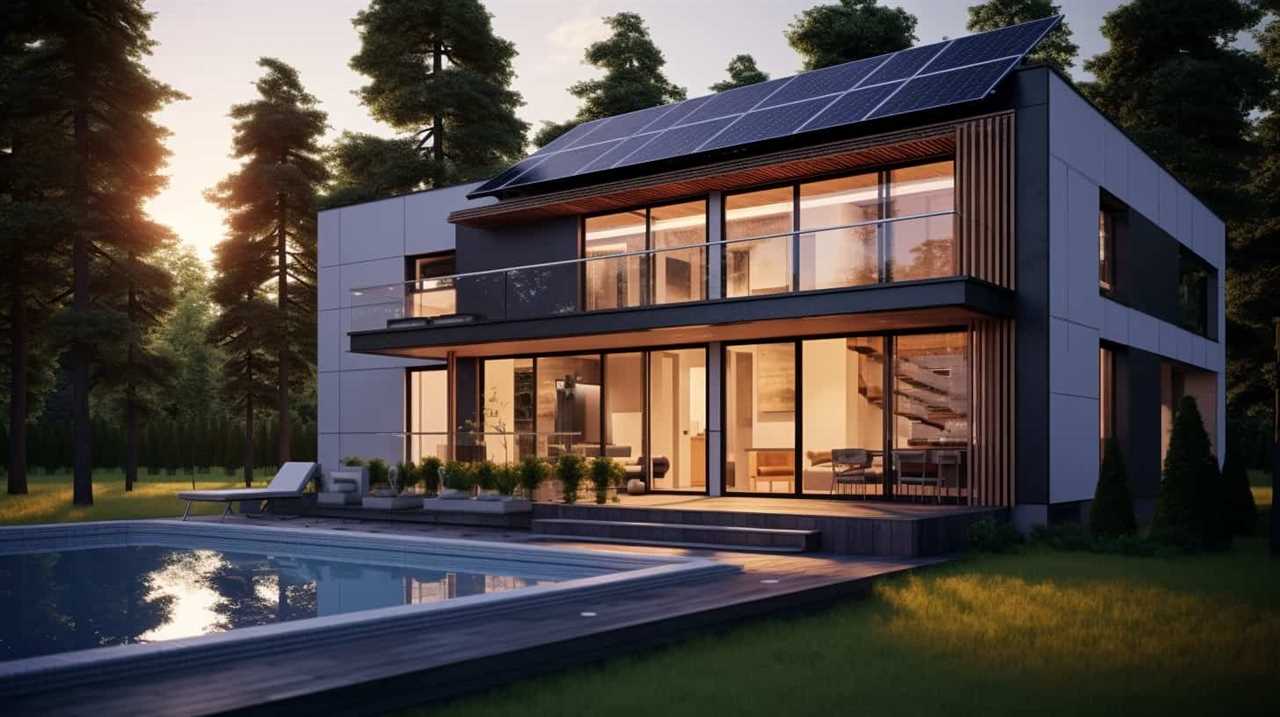
Importance of Energy Efficiency in Heat Pumps
Energy efficiency ratings and cost savings are key considerations when choosing a heat pump. It’s important to understand the benefits of energy efficient heat pumps, as they not only save money on energy bills but also help reduce greenhouse gas emissions.
Here are some reasons why energy efficiency is crucial in heat pumps:
-
Lower energy consumption: Energy efficient heat pumps require less energy to operate, resulting in lower energy bills and reduced environmental impact.
-
Increased comfort: Energy efficient heat pumps provide consistent heating and cooling, ensuring a comfortable indoor environment all year round.
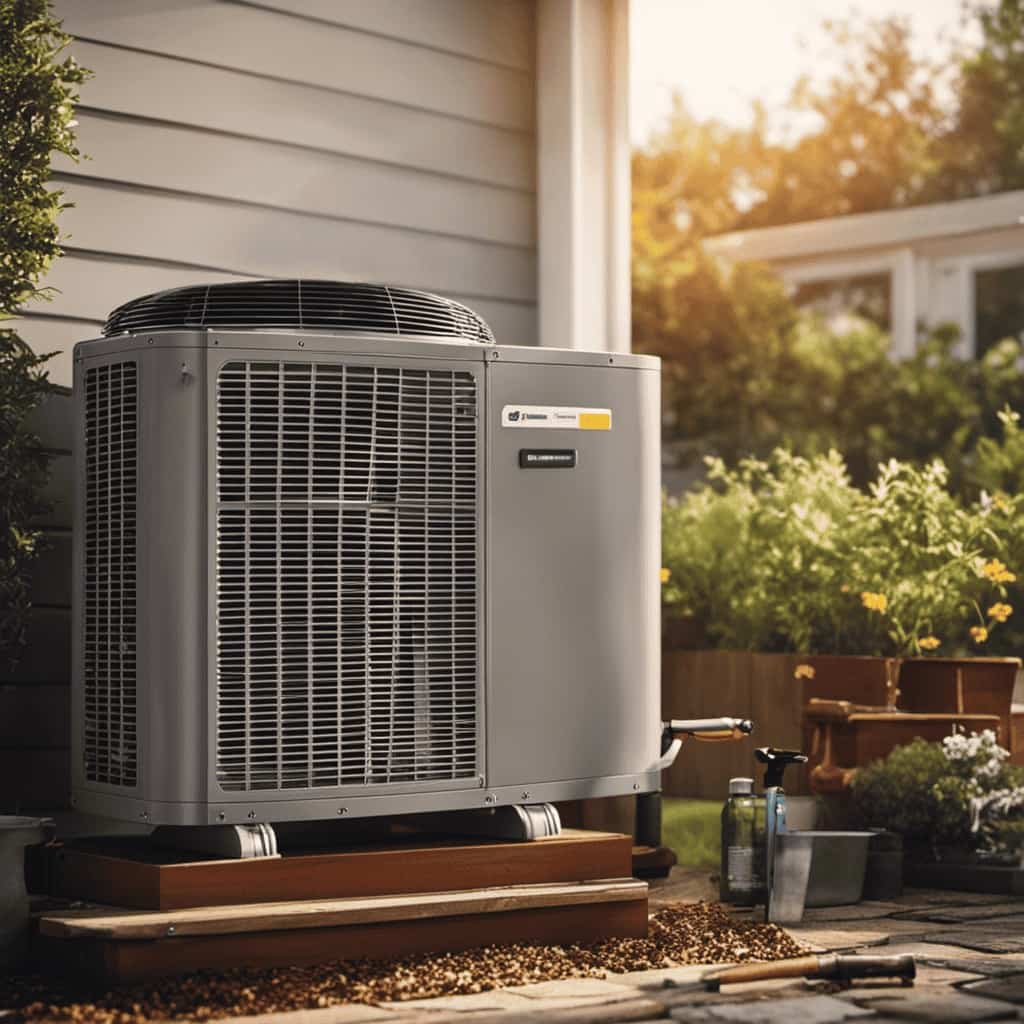
-
Government incentives: Many governments offer incentives, such as tax credits or rebates, to encourage the use of energy efficient heat pumps, making them more affordable.
-
Environmental benefits: Energy efficient heat pumps help reduce carbon footprint and contribute to a greener and more sustainable future.
Considering these factors, investing in an energy efficient heat pump not only saves money but also helps protect the environment.
Factors Affecting Energy Efficiency Ratings
When considering energy efficiency ratings for heat pumps, there are several factors that can affect their overall performance. These factors include the installation process and the impact on environmental sustainability. Proper installation is crucial for the optimal functioning of a heat pump. Factors such as correct sizing, proper ductwork, and adequate insulation can greatly impact the energy efficiency of the system. Additionally, the materials used during installation, such as the type of refrigerant and insulation, can also play a role in the overall efficiency. Furthermore, the impact on environmental sustainability is another important factor to consider. Heat pumps that use environmentally-friendly refrigerants and have high energy efficiency ratings contribute to reducing greenhouse gas emissions and conserving energy resources. By considering these factors, homeowners can make informed decisions to maximize the energy efficiency of their heat pump systems.
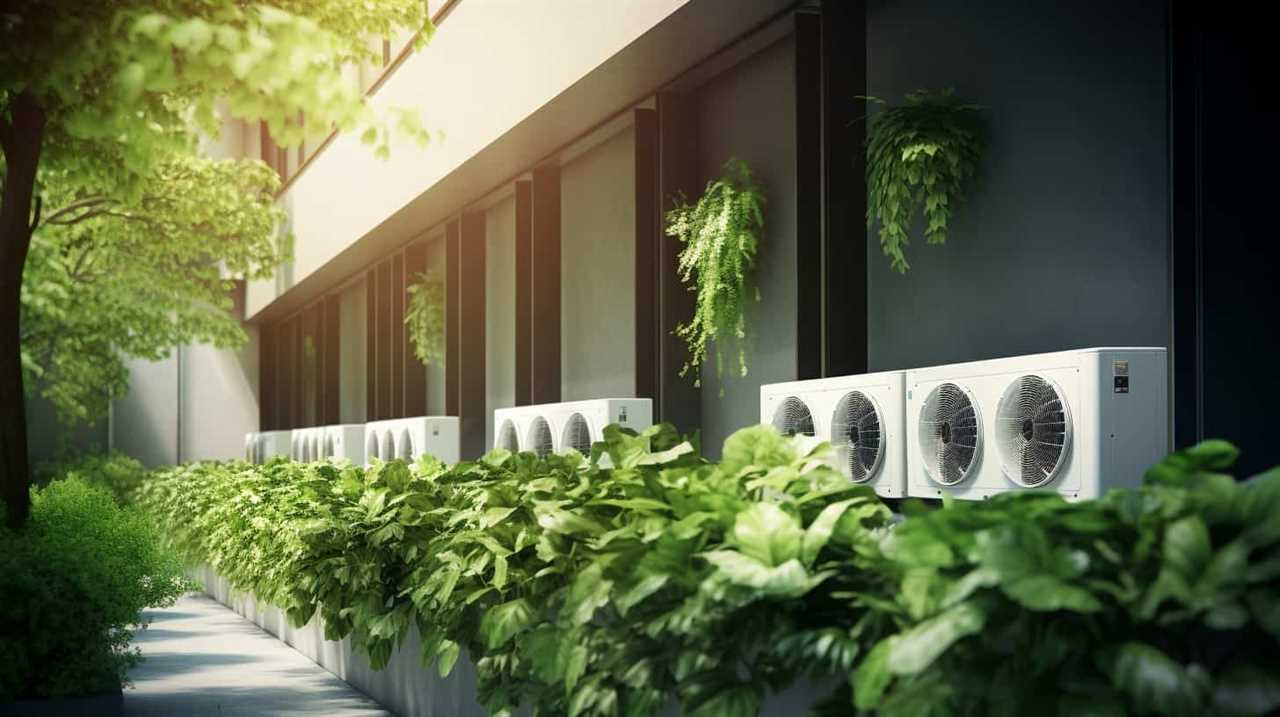
| Factors Affecting Installation | Impact on Environmental Sustainability |
|---|---|
| Proper sizing | Use of environmentally-friendly refrigerants |
| Correct ductwork | High energy efficiency ratings |
| Adequate insulation | Reduced greenhouse gas emissions |
| Quality materials | Conservation of energy resources |
Comparing Energy Efficiency Ratings of Different Heat Pump Models
We can compare the energy efficiency ratings of different heat pump models by considering their performance and cost-effectiveness. When evaluating the energy efficiency of heat pump models, it’s important to consider the pros and cons of different heat pump technologies. Here are some key points to keep in mind:
-
Air-source heat pumps: These are the most common type of heat pump and are generally more affordable. However, they may be less efficient in extremely cold climates.
-
Ground-source heat pumps: Also known as geothermal heat pumps, these models are highly efficient and provide consistent heating and cooling. However, they tend to have a higher upfront cost.
-
Hybrid heat pumps: These models combine the efficiency of an air-source heat pump with a backup furnace for colder temperatures. They offer flexibility and cost savings.
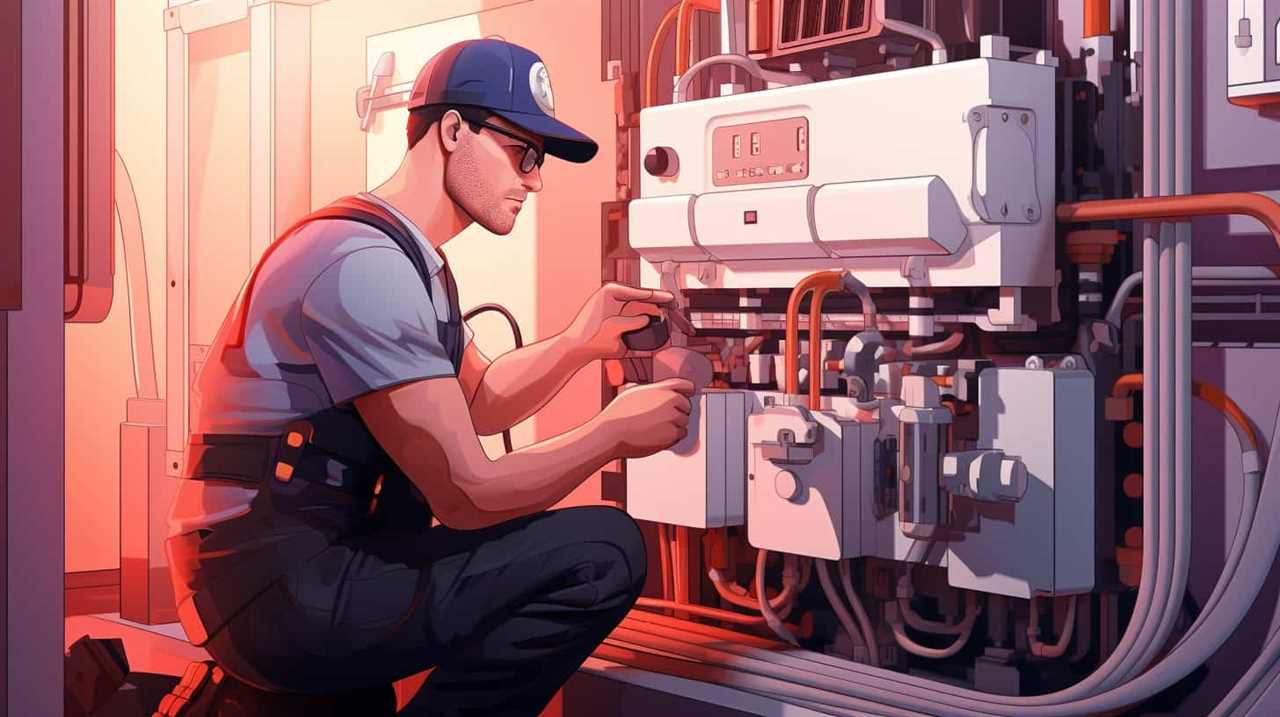
To maximize energy efficiency in heat pump operation, consider these tips:
-
Regular maintenance: Keep the heat pump clean and ensure proper airflow for optimal performance.
-
Programmable thermostat: Set temperature schedules to avoid unnecessary energy consumption.
-
Insulation: Properly insulate your home to reduce heat loss or gain.

-
Proper sizing: Ensure that the heat pump is properly sized for your home to avoid energy wastage.
Calculating the Cost-Effectiveness of Energy Efficient Heat Pumps
To determine the cost-effectiveness of energy efficient heat pumps, we can calculate the long-term savings on energy bills compared to the initial investment. By investing in an energy efficient heat pump, you can significantly reduce your energy consumption and save money in the long run.
These heat pumps are designed to operate with higher efficiency, meaning they use less energy to produce the same amount of heat. This translates to lower energy bills and substantial cost savings over time.
Additionally, energy efficient heat pumps have a positive environmental impact by reducing carbon emissions and decreasing your carbon footprint. By choosing an energy efficient heat pump, you not only save money but also contribute to a greener and more sustainable future.
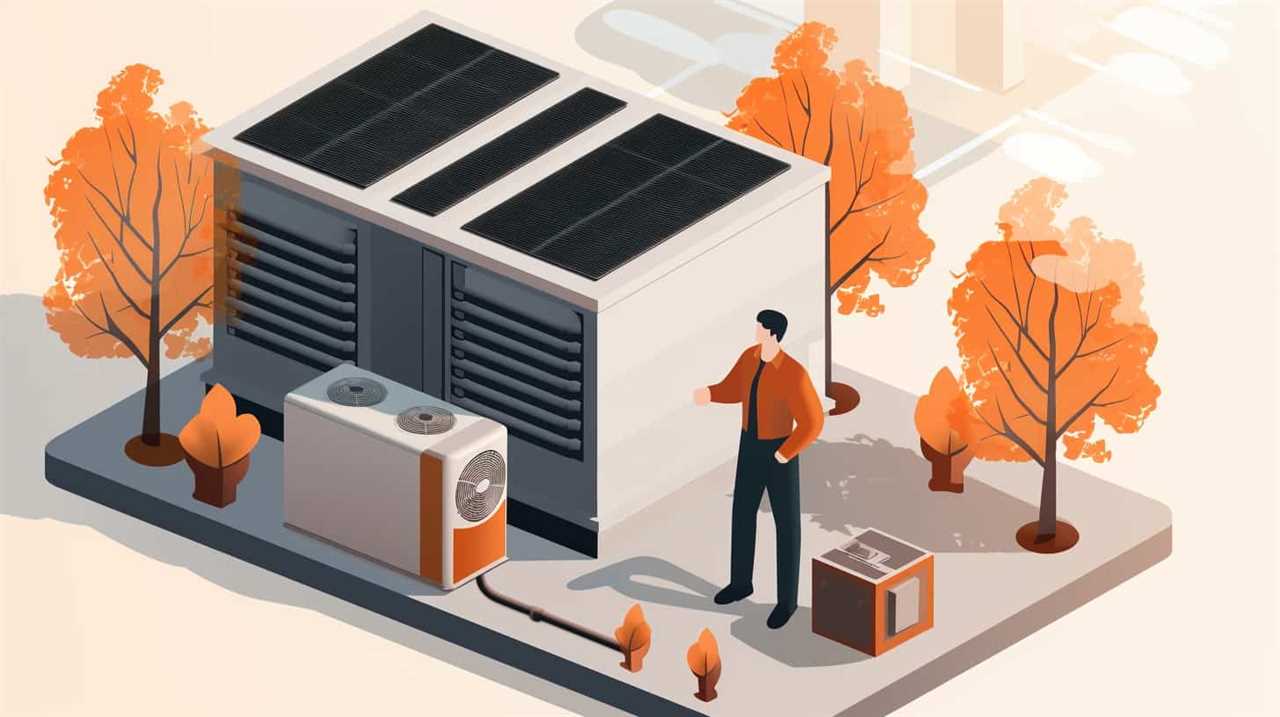
Frequently Asked Questions
How Do Heat Pumps Contribute to Reducing Greenhouse Gas Emissions?
Heat pumps contribute to reducing greenhouse gas emissions by using renewable energy sources to heat and cool spaces. This technology greatly benefits the environment and helps combat climate change, making it a sustainable and efficient choice for homes and businesses.
Are There Any Government Incentives Available for Purchasing Energy Efficient Heat Pumps?
Yes, there are government incentives available for purchasing energy efficient heat pumps. These incentives aim to promote energy savings and can include tax credits, rebates, and grants.
Can Heat Pumps Be Used for Both Heating and Cooling Purposes?
Yes, heat pumps can be used for both heating and cooling purposes. They have the advantage of being energy-efficient and can provide consistent temperature control. However, they may have some disadvantages such as high initial costs and limited effectiveness in extreme climates.
What Is the Average Lifespan of a Heat Pump?
The average lifespan of a heat pump depends on various factors such as usage, maintenance, and quality. Regular maintenance is crucial for prolonging its lifespan and ensuring optimal performance.
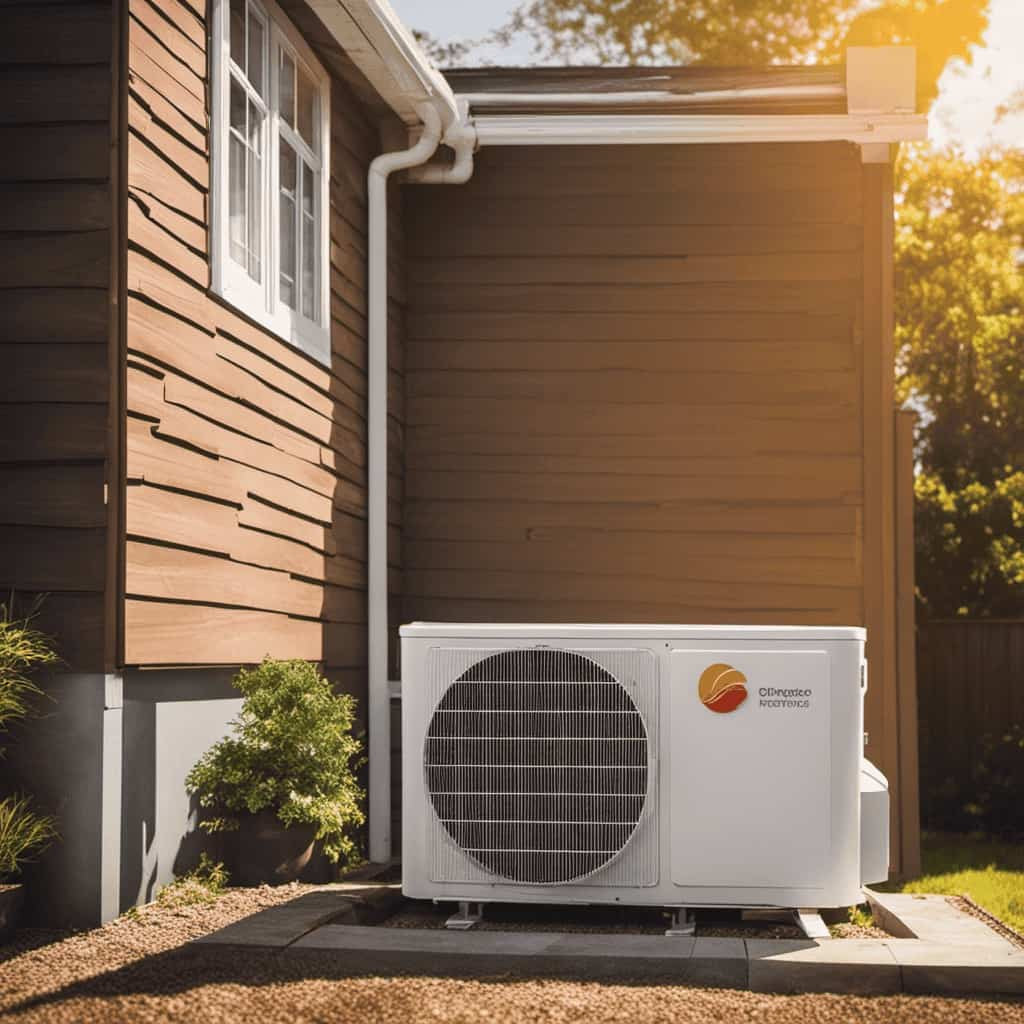
Are There Any Maintenance Requirements for Heat Pumps to Ensure Optimal Energy Efficiency?
To ensure optimal energy efficiency, heat pumps require regular maintenance. This includes cleaning or replacing air filters, inspecting and cleaning coils, and checking refrigerant levels. By following these maintenance requirements, homeowners can enjoy significant energy savings.
Conclusion
In conclusion, understanding energy efficiency ratings is crucial when it comes to choosing a heat pump.
Just like a well-oiled machine, an energy-efficient heat pump can smoothly and seamlessly provide comfort while saving on energy costs.
By comparing the energy efficiency ratings of different models and calculating their cost-effectiveness, we can make informed decisions that benefit both our wallets and the environment.

So, let’s make sure to choose a heat pump that’s like a finely tuned instrument, delivering efficient performance and long-term savings.









